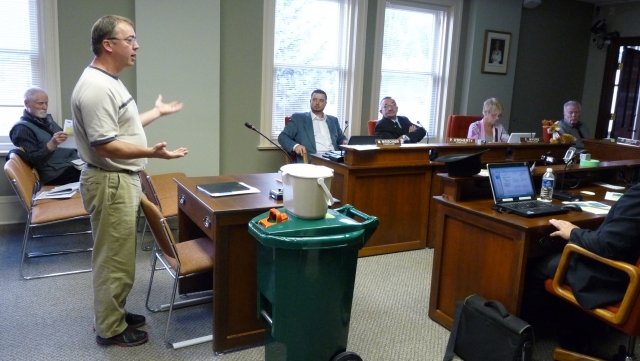SUMMING IT UP: Grand Forks City Council
Along with being located across the road from each other, the slag pile and the landfill were also the key topics of interest at Grand Forks city council’s last meeting.
Tim Dueck, solid waste management co-ordinator with the Regional District of Kootenay Boundary (RDKB), was on hand at the meeting talking to the success of the pilot organics recovery project in Valmar are of Grand Forks and to introduce their next steps.
With the new program residents will separate out their food scraps, including meats, papers that are food soiled, facial tissue, hand towels, pizza boxes, and even kitty litter and place these items in a green bin for collection. The bin is designed to be animal proof, and a smaller plastic bin is also provided to collect the scraps inside your kitchen.
The reason: diverting this waste lowers the volume of garbage in the landfill and will keep the dump working longer. Replacing the landfill is an extremely costly process, explained Dueck, and by diverting compostable items will have a large impact.
“The green bin collection program is not designed to get people to stop backyard composting,” Dueck added. “We are targeting the material that is already in our garbage stream.”
The green bins are coming to a home in Grand Forks at the beginning of October, said Dueck, pointing out the impacts that the change in how garbage is managed is significant.
“One of the biggest sections of our garbage is organics or food waste,” said Dueck. “We have been running this pilot project since Jan. 2012. Before we started we weighed people’s garbage from the subdivision. We had a tonne of garbage from the 128 residences in the subdivision. After we implemented the food scraps recycling program we basically saw that amount of garbage cut in half.”
The bins are on order to roll out the composting program to all residents and will be delivered, along with information on how to use them and what can be composted, by Oct. 1. With 89 percent of the pilot project’s users saying they feel they have less garbage each week, Dueck expects that the rest of the city will be very receptive to the new program. With reduced garbage year after year the city could even see its tipping fees go down, a potential cost savings for residents.
The compost will be used for the first three years to cover existing landfill sites within the region, and then will be available for sale.
Slag pile sinkhole investigation
After a preliminary review of the Granby Mines slag pile, owned by the City of Grand Forks and located alongside the Granby River, on July 16 after a sinkhole and crevices were noted by contractors to be developing, a geotechnical review was done.
While the Slag Pile is mined by Pacific Abrasives & Supply Inc., under an exclusive contract, the City of Grand Forks is the owner of the slag pile properties. In his report geotechnical engineer Andrew Van Dyk stated,“The size of the depression at the ground surface due to the soil pipe collapses are expected to be proportional to the subsurface cavity that existed prior to the collapse. Based on the size of the collapse, it is expected that they developed over several years and brought to a critical state by the increased groundwater seepage resulting from the high precipitation received this year.” He referenced that part of the Pacific Abrasives operation includes a settling pond which is contained by a ten foot berm along the west, south and north sides. He added, “Soil pipes develop over time and remain undetected for several years. At least four seepage areas into the pond were reportedly observed during the pond construction. It is reasonable to suspect that other cavities may exist in the area.”
Following the recommendations of the report, council authorized city staff to proceed with a geophysical survey followed by a subsurface borehole investigation, in order to determine if there are cavities beneath Granby Road. The cost of the survey is estimated to be a maximum of $10,000, which will be funded from the slag sales revenue reserve fund.
Looking for a new home for Gyro Park artifacts
Council discussed the historical artifacts currently displayed at Gyro Park and options to use the buildings in the park for other activities. It was pointed out by mayor Brian Taylor that in order to move the artifacts the Boundary Museum Society would need to construct buildings at their current location, an item requiring significant funding.
An agreement to assist the society in pursuing funding options for a new building for the museum and to formally include the project in their next budget planning process was unanimous.
Other
Bylaws were formally passed to reflect increases in water and sewer fees by four percent according to the approved 2012 budget.
Council discussed a request to increase the size of the dog park currently located at the south end of the cemetery. No decision was made at this time.
The animal control contract has been put out for tender by the RDKB and a contractor will be hired after due process.






















